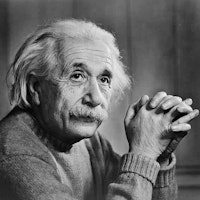The Power of Imagination
Topic: Wisdom & Understanding
I am enough of an artist to draw freely upon my imagination. Imagination is more important than knowledge. Knowledge is limited. Imagination encircles the world.
Albert Einstein, born on 14 March 1879 and passing away on 18 April 1955, stands as one of the most renowned theoretical physicists in history. Best known for his groundbreaking special and general theories of relativity, his scientific endeavors spanned a multitude of areas within the field of physics. Amongst his numerous accolades, he was awarded the Nobel Prize in physics for his elucidation of the photoelectric effect—a phenomenon that expanded the horizons of quantum theory.
Einstein's journey, however, wasn't merely defined by scientific discoveries, but by the myriad challenges he overcame across various dimensions of his life. In his spiritual journey, he grappled with the concepts of God and universe. Socially, he navigated the complexities of his time—facing the rise of anti-Semitism, experiencing exile from his homeland due to Nazi oppression, and advocating for civil rights, disarmament, and global peace. These adversities only strengthened his resolve and underscored his resilience.
Beyond his professional accomplishments, Einstein's life was enriched by a tapestry of relationships and dialogues with luminaries from diverse fields. He engaged in profound conversations on the nature of reality with the likes of the Indian poet Rabindranath Tagore, discussed the principles of non-violence with Mohandas Gandhi, and deliberated on humanitarian issues with Albert Schweitzer. Furthermore, his camaraderie with fellow scientists and physicists provided a fertile ground for intellectual exchanges, fostering an environment of collaboration and innovation during one of the most exciting epochs in scientific history.
Albert Einstein. Brian, Denis. Einstein: A Life. John Wiley & Sons, 1996, p. 300. [What Life Means to Einstein: An Interview by G. S. Viereck, The Saturday Evening Post (26 October 1929)] p. 17.

Albert Einstein
Theme: Wisdom


About This Albert Einstein Quotation [Commentary]
Albert Einstein’s statement, “Imagination is more important than knowledge,” points to the essential role of creativity in the pursuit of wisdom. In his 1929 interview for The Saturday Evening Post, he explained further: “Knowledge is limited. Imagination encircles the world.” He draws a clear distinction—knowledge covers what is already known, while imagination reaches beyond those boundaries. It is through imagination that new possibilities emerge, making it indispensable for any deep engagement with understanding.
When Albert Einstein said, “I am enough of an artist to draw freely upon my imagination,” he highlighted the need for both intuitive freedom and disciplined thought. His major discoveries, including the theory of relativity, came not only through mastering facts but through daring to think differently. Imagination, for him, was not idle fantasy; it was the means to challenge limits and extend human understanding. It made knowledge dynamic, opening spaces for discovery that facts alone could not reveal, and keeping wisdom rooted in creativity as much as in study.
By affirming that “imagination encircles the world,” Albert Einstein reminds us that wisdom grows through a relationship between what is known and what can still be envisioned. Knowledge builds structure, but imagination expands possibility. Within the theme of wisdom, imagination invites ongoing exploration and renewal. Albert Einstein’s insight encourages a thoughtful balance: honoring what is known, while remaining open to the larger fields imagination makes visible.
Einstein: “That is what I believe”
As reported in Einstein—A Life (1996) by Denis Brian, when asked about a clipping from a magazine article reporting his comments on Christianity as taken down by Viereck, Einstein carefully read the clipping and replied, “That is what I believe.”
Additional Albert Einstein Quotations
“As a child, I received instruction both in the Bible and in the Talmud. I am a Jew, but I am enthralled by the luminous figure of the Nazarene.”
—Albert Einstein [What Life Means to Einstein (1929)].
“No one can read the Gospels without feeling the actual presence of Jesus. His personality pulsates in every word. No myth is filled with such life.”
—Albert Einstein [Einstein–A Life (1996)].
Related Quotes
Copyright © 2017 – 2026 LuminaryQuotes.com About Us